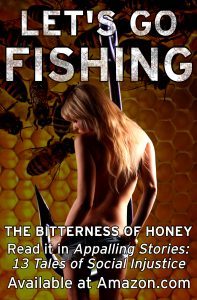David Dubrow's Blog, page 15
March 5, 2018
Appalling Stories: Excerpt
I’m not any kind of writer. I’m not John Grisham. I don’t even read except for the sports page. So if you don’t like my writing style I don’t give a shit. What I’m going to do when I’m done putting all this down is wrap the notebook in fifty layers of Saran Wrap, stuff it in a bunch of Publix bags, and lock it up in the gun safe. The safe’s supposed to be fireproof.
I don’t have to tell you that. If you’re reading this you must’ve gone to a hell of a lot of trouble to get to it. If there even is a you. My bet is no one will ever see this.
Why am I writing it, then? Something to do before I die. The TV doesn’t work anymore. Nothing does. I don’t have any kids (that I know of, hyuck hyuck) to leave anything to. No close family. A few friends, but I’m sure they’re dead now.
I’m next. I can hear them outside. They’ll find a way in and that’ll be that. You can’t shoot them. I mean, it’s impossible. So when they do get in I’ll put my Colt 1911 to my eyeball and pull the trigger.
I hope it doesn’t hurt.
(Taken from The Bitterness of Honey by David Dubrow.)
—
This story, along with twelve other hard-hitting tales of science fiction, satire, horror, and more are available in Appalling Stories: 13 Tales of Social Injustice!







March 1, 2018
A Hundred Thousand Heorots
 Music’s a deeply personal thing: what you like, what you don’t like, what you love, what you can’t stand. When I was writing for Exposure Bucks at The Loftus Party, I took the #ScrewYouILikeIt hashtag Michael Loftus suggested in his podcast and ran with it, talking about my horrible taste in 80’s bands. The lukewarm response to the piece suggested that my Exposure check bounced.
Music’s a deeply personal thing: what you like, what you don’t like, what you love, what you can’t stand. When I was writing for Exposure Bucks at The Loftus Party, I took the #ScrewYouILikeIt hashtag Michael Loftus suggested in his podcast and ran with it, talking about my horrible taste in 80’s bands. The lukewarm response to the piece suggested that my Exposure check bounced.
Current events see me going back to the 1980’s musical well once more. Today I’m focusing on the band Marillion and its early years, when Derek Dick, AKA Fish, was the lead singer. My favorite Marillion song is Grendel from the 1988 album B’Sides Themselves. It’s an amazingly macabre song, grim and brooding and horribly violent, just like its principal character: the inhuman beast Grendel from the Old English poem Beowulf. If you haven’t read Beowulf before, I urge you to get a copy. In my college years I had to translate the first few pages myself for a class in Old English, which fulfilled a language requirement. It wasn’t as much fun as you’d think. So get a translated copy and read it.
The song Grendel focuses on Beowulf‘s chief antagonist: the man-eating monster Grendel. Its early stanzas describe not just Grendel’s monstrous acts, but the terror he inflicts on the helpless Danes:
Wooden figures, pagan gods, stare blindly cross the sea
Appeal for help from ocean fogs, for saviour born of dreams
They know their lives are forfeit now, priestly heads they bow in shame
They cannot face the trembling crowd that flinch in Grendel’s name
The Viking gods the Danes worship can’t stop Grendel, whose hunger is never sated. As King Hrothgar’s Danes cower in Heorot, their redoubt, the beast comes nightly to take another warrior. And another. And another. The song’s chorus reinforces the Danes’ helplessness:
Earth rim walker seeks his meals
Prepare the funeral pyres
The shaper’s songs no longer heal the fear
Within their eyes, their eyes
The shaper is a blind man, a poet and minstrel, who sings songs of heroism to bolster the courage of Hrothgar’s men. Grendel is himself both fascinated and enraged by the shaper, and near the end of the song, when things really pick up, Grendel speaks in his own voice:
So you thought that your bolts and your locks would keep me out
You should have known better after all this time
You’re gonna pay in blood for all your vicious slander
With your ugly pale skins and your putrid blue eyes
The song climaxes with Grendel’s furious cry, “Receive your punishment, expose your throats to my righteous claws and let the blood flow, and let the blood flow, flow, flow, flow.”
 And the blood does flow. In the poem, the Geat (Swedish) hero Beowulf rips off Grendel’s arm, killing him, and then tracks Grendel’s mother to her home beneath a lake and kills her, too.
And the blood does flow. In the poem, the Geat (Swedish) hero Beowulf rips off Grendel’s arm, killing him, and then tracks Grendel’s mother to her home beneath a lake and kills her, too.
As we learn more about the horrible events in Parkland, Florida, from the dreadful failures of law enforcement on all levels to the foolish and cowardly calls to disarm in the face of evil, we’re finding that America’s schools are more like Heorot than we imagined, helpless to defend against the bloodthirsty Grendels that would assail them. In Parkland, no Beowulf came to save the children; instead, law enforcement waited outside while the monster sated himself with seventeen lives.
That’s unacceptable. It also reinforces something many of us have known our whole lives: we each have to be our own rescuer. Our own Beowulf. Your default cannot, must not be set to helplessness. The next school shooter, the next Grendel is right now, at this very moment, planning an attack on innocent children. Banning bump stocks or “assault weapons” or all firearms will not stop him. What will stop him is the bravery of individuals who have taken the responsibility of their own personal safety into their own hands.
Unlike the Grendel of Beowulf, it doesn’t take a magic sword or a legendary hero to take down a school-shooting maniac. All it takes is a well-placed bullet. America’s public schools are a hundred thousand Heorots, proclaiming themselves gun-free zones while Grendel lurks at the threshold. Let’s act in our own defense.







February 26, 2018
Appalling Stories: Excerpt

Kyle’s pulse accelerated. He tapped login and password. A long-awaited message popped up on the screen: Congratulations, KyNe007! You’re approved! Your reservation to The Orishas is being processed!
A thrill snaked up his leg. A daunting task to book a spot! The Orishas was no ordinary resort: adult, erotic, exclusive and secret, catering to special tastes. You submitted a request to attend and you were checked out. Nothing cursory: they dug. Orishas required a lengthy and probing questionnaire, credit check and a checkbox psych and medical evaluation, all done on-line. No poseurs or risk candidates allowed: only a select and completely safe clientele gained admittance.
And now he ranked among those admitted. The Elite, the Chosen.
Of course, it cost a wad and a half with payment in advance. But this proved no obstacle; Kyle transferred the funds from his bank to the The Orishas LLC in the Caymans with a few clicks. AFC, with liberal policies regarding time off, required only firm calendar dates for Kyle’s pre-approved vacation.
Kyle had planned this vacation for a year. Now it came together. Via secure email The Orishas transmitted various contracts, disclaimers and waivers for Kyle to read and sign. He sat down with another icy lager and a plate of celebratory chocolate habanero peppers that set his gums afire.
He exulted: Orisha-bound. Oh for joy!
(Taken from The Orishas by Ray Zacek.)
—
This story, along with twelve other hard-hitting tales of science fiction, satire, horror, and more are available in Appalling Stories: 13 Tales of Social Injustice!







February 21, 2018
The Ugly Truth About Gun Issues in America
 It’s time for some straight talk about guns in the United States. This is likely to alienate many of you, but we’ve tiptoed around this issue long enough. I’ve been a part of America’s gun culture for two decades, both personally and professionally; I’ve produced, directed, shot, and edited several instructional videos on combat shooting; and I’ve studied firearms tactics, real-world examples of gun violence; and the history of the U.S. Constitution, where the Second Amendment resides. So I know a little bit about the issue of private firearm ownership.
It’s time for some straight talk about guns in the United States. This is likely to alienate many of you, but we’ve tiptoed around this issue long enough. I’ve been a part of America’s gun culture for two decades, both personally and professionally; I’ve produced, directed, shot, and edited several instructional videos on combat shooting; and I’ve studied firearms tactics, real-world examples of gun violence; and the history of the U.S. Constitution, where the Second Amendment resides. So I know a little bit about the issue of private firearm ownership.
The most important thing to take away from what I’m saying is this: gun owners think that people who want to take away their right to own guns are pussies. Sissies. Cowards. If this is you, you’ve outsourced the protection of your family to others. You’ve abandoned your responsibility as a man. Not only that, but in your pants-wetting fear of an inanimate object, you would make everyone else as helpless as you are. There’s a tiny part of you that knows you’re weak, and this knowledge makes you feel small in the presence of braver men. After all, nobody wants to be the only coward; misery loves company. So you’d enslave us all to your personal weakness. Whether you’re a brother, a parent, a teacher, or a friend, we’ll always have that reservation about you, because you’ve succumbed to an irrational fear and demand that all other men do the same. It’s ugly and mean and unfair, but that’s the way it is, and if you ask any law-abiding gun owner for the honest truth, he’ll say the same thing. We don’t talk about it much, if at all, but it’s always there. Always. Trust me. In a free country like the U.S., your anti-gun stance is entirely voluntary. You don’t have to be a coward. But you choose to. The only way you could invite more contempt is to adopt the mantle of male feminist. Or use the term “toxic masculinity” without irony.
There are some caveats.
It Happened to You: We understand that if you or someone very close to you has been an innocent victim of gun violence, you might become a gun-grabber as a result. (A gun-grabber is someone who would deny other people their Second Amendment rights.) It’s unfortunate, but we get it. We wish you’d think differently, but we sympathize and hope you’ll eventually come to the wisdom that whatever happened to you was a result of an evil action by an evil person with evil intent. It has nothing to do with the vast, vast majority of legal gun owners who don’t commit murder with firearms.
You’re a Kid: Young people often think emotionally, not logically. We expect children to act on their emotions, so they typically get a pass on serious issues. It’s why we don’t elect children to higher office or consult them on important policy decisions (unless it’s good PR to take the meeting). They lack wisdom and experience. When children are trotted out in front of microphones to bleat about the evils of firearms, we don’t take them seriously. We do feel bad for them, however, because they’re usually saddled with ineffectual, unwise parents who haven’t brought them up properly. And we contemn the adults who thrust them into the limelight as manipulative, amoral creeps.
You’ve Got a Uterus: Despite the many, many efforts by our betters in the media, academia, and politics to ignore the basic differences between the sexes, we don’t expect women to take on traditionally masculine roles unless circumstances demand it. However, it’s clear that many gun-grabbers are women. What female gun-grabbers don’t understand is that the gun-grabbing stance feeds into every negative stereotype of women ever conceived of: weak, defenseless, easily frightened, manipulative (“let’s you and him fight”), vituperative/shrewish (“you need a gun because you’ve got a small dick”). These are not traits of strong, independent women, and yet they characterize female gun-grabbers to a T.
You Ain’t from Around Here: You may live in a country that has disarmed its populace. It sucks. We get it. We understand that you can’t always just pack up and move to a place that respects rights granted to you by your Creator. So we give you a pass…until you start talking about taking away other people’s firearms. People from gun-free Utopias who feel like they have to insert themselves into the gun debates of other countries are subject to the same deserved contempt as the native cowards who would disarm everyone else.
You Just Don’t Have One: It’s perfectly fine if you decide that owning a firearm and addressing the issues associated with it aren’t relevant to your daily life. It’s a luxury, one you should appreciate. All we ask is that you keep your ambivalence to your own personal sphere, and don’t try to curtail everyone else’s liberties.
What frustrates us about the debate on gun ownership is that the arguments against it are so weak, so foolish, so emotionally-derived that no thinking adult can take them seriously, and yet they come up again and again. These arguments are almost invariably promulgated by people who don’t own guns, have never shot a gun, aren’t familiar with gun culture, and know less about guns than I know about 14th century Swedish poetry. And yet whenever some sickening clot of human debris commits a mass murder with a gun, the same arguments are shoved into the limelight as if they’ve never been addressed before.
If You Loved Your Kids as Much as You Love Your Guns, You’d Repeal the 2nd Amendment: Gun owners are as horrified and dismayed at what happens during a mass shooting as any normal human being. We grieve terribly for the murdered children in Parkland, Florida; Newtown, Connecticut; Virginia Tech; etc. It’s a nightmare too horrible to contemplate: to kiss your child goodbye, send him off to school, and learn that he’s never coming home again because a monster shot him to death. I’d die in place of my little boy in a heartbeat. So it’s a malicious, inhuman assumption among gun-grabbers that gun owners love our guns more than we love our children. Note also that gun-grabbers are typically pro-choicers (abortion enthusiasts). More unborn babies are murdered in the womb each year than are killed with firearms by a factor of over 400 , and yet we’re the ones who don’t love our children? We love our children so much that we’re willing to risk our own lives to protect them. Gun-grabbers have abandoned that sacred duty, not us. If gun-grabbers loved their kids more than they love living in fear, they’d stop infringing on everyone’s right to self-defense.
What About Common Sense Gun Control Laws: When you’re a coward who demands that other men risk their lives to protect your family, your definition of common sense is far, far different from mine. Not only that, but gun-grabbers never stop; the ambition of every gun-grabber ever minted is to outlaw all private firearms ownership. They won’t admit it in public, but it’s true, and we all know it, and that’s why we will never ever give an inch on this issue. No more new laws. No more curtailing God-granted liberties. Gun-grabbers will never be satisfied until everyone’s as disarmed and helpless as they are. They won’t stop, so we won’t budge. We’re not as stupid as they imagine us to be.
Who Needs a Military-Style Assault Rifle, Anyway: Just using the term “military-style assault rifle” shows you to be unserious and ill-informed, but we’ll set that aside to address the wider issue. You don’t get to determine the nature and style of the tool I use to defend my family. Do I get to choose which car you drive? Which house you own? No? Why not? Cars aren’t mentioned in the Constitution, but guns are. You don’t have a right to own a house or a car. The Second Amendment is part of the Bill of Rights, not the Bill of Needs. So if I decide that I need an AR-15 to protect myself, that’s my decision, not yours. No, the Framers of the Constitution didn’t conceive of 30-round magazines, but they also didn’t imagine the internet, either. And yet you’re on it, spewing out ill-informed buffoonery in the wake of a terrible event. The First Amendment actually covers that, so go for it. But if I decide that I need an AR-15, and it’s legal for me to own one, get out of my way, coward.
The Only People Who Should Own Guns Are the Police and Military: For childish, emotionally-derived thinking, this one tops everything. Even if you do repeal the Second Amendment and outlaw private firearms ownership (which will never, ever happen), how are you going to enforce the ban? One of the things that makes America great is that we won’t allow our God-given rights to be stripped away, and we definitely won’t offer up our firearms to be confiscated. So what are you going to do, go to every house in America with armed men and search for guns? Doesn’t that go against the Fourth Amendment? Are you going to repeal that amendment, too? How will you enforce this country-wide gun seizure to achieve the violence-free Utopia of your dreams? Doesn’t this kind of thinking make you a dirty, nasty, authoritarian little fascist? Even if your gun confiscation fantasy somehow comes to pass, you’ve only disarmed the law-abiding part of the population. The criminals, who by definition don’t follow laws, will still be armed, leaving everyone else at their dubious mercy. Not only that, but if we’ve learned anything from the last couple of years, it’s that the police are corrupt racists who love to shoot people of color. Black Lives Matter and its accomplices in the news media, entertainment sphere, and political office taught me that. And you want the police to own all the guns? Do you see the contradiction here?
Unilateral Disarmament Works in (Insert Utopian Country Here): The U.S. is not Australia. Or the UK. Or France. Or Norway. We have different people, a different culture, different mores, and a different form of government. Our Constitution enshrines inalienable rights that no other country allows. So what works in your overseas Utopia won’t work here. If the people of Australia are so much more enlightened and violence-free, what’re you doing with us gun nuts, anyway? Don’t you care about your children? If you loved your children you’d get them away from the gun-crazy lunatics in this country, wouldn’t you?
If any of this upsets you, good: growth only comes from discomfort. Gun-grabbers always want to have a conversation about guns, but they never want to talk about the things that actually contribute to gun violence, like the dangerous effects of psychoactive medication on young people. Or the increase of graphic violence in popular media. Or the embrace of disgusting, violence-soaked rap culture. Or the deliberate destruction of the traditional family. Not only that, but if you dare to mention these issues in public, you run the risk of social and professional ostracism: it’s racist to criticize rap culture. It’s bigoted/homophobic/sexist to support traditional families. It’s anti-science to question the wisdom of drugging difficult children. So the gun-grabbers get to control the conversation: defend your gun fetish on our terms, you child-hating, death-loving reprobate, and don’t bring up anything else because it’s racist. Sexist. A distraction. Whataboutism.
There really is no point to debating gun ownership. Gun-grabbers dishonestly misrepresent the argument at every turn, wave children’s bloody shirts before the red has dried, and are motivated by Utopian fantasies better suited to John Lennon-esque song lyrics than serious policy. Cowardice is a choice, not a necessity.







February 19, 2018
Appalling Stories: Excerpts
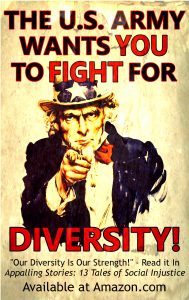 He wiped some sweat out of his eyes and tugged at the top of his body armor where it was pushing just a little too much into his throat. We were kneeling on the rocky ground between some low-growing vegetation. General Cardiff sat in on our discussion.
He wiped some sweat out of his eyes and tugged at the top of his body armor where it was pushing just a little too much into his throat. We were kneeling on the rocky ground between some low-growing vegetation. General Cardiff sat in on our discussion.
“Am I missing anything, sarge?” Lieutenant Kettering asked.
“No, sir. You’re doing fine,” I said.
Lieutenant Kettering and the two other troops would reconnoiter the Taliban from that hill. It would allow us to see the entire objective, verify the size of the forces there, how ready to defend they were, and it would allow us to verify that our preferred avenue of approach was clear. After that it would become an observation post during the assault.
“Just make sure you and your soldiers are careful,” the general said.
“Yes, sir,” Lieutenant Kettering said. “We are very safety-conscious.”
The general squinted at him. “I mean, you need to make sure your soldiers know not to endanger any of the local populace.”
“Y-yes, sir,” Lieutenant Kettering said again. “But we’re just doing reconnaissance right now, and our intelligence said there likely aren’t any civilians here.”
“Lieutenant Kettering, you can’t trust that intelligence is one hundred percent accurate,” the general told him, tapping his gloved left index finger on the bipod of his M4 carbine. “So you better make sure your troops are aware of civilian considerations. We’re here to serve the Afghan people.”
(Taken from Our Diversity Is Our Strength! by Paul Hair)
—
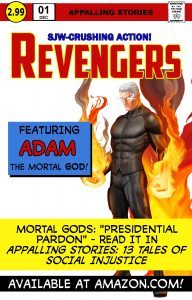 Adam was about to send another blast in his fight against Oscar when something slammed into his back, shredding his shirt and ripping his flesh. The impact sent him tumbling through the sky. He quickly righted himself and zeroed in on what had hit him.
Adam was about to send another blast in his fight against Oscar when something slammed into his back, shredding his shirt and ripping his flesh. The impact sent him tumbling through the sky. He quickly righted himself and zeroed in on what had hit him.
Adam raised his hands in time to shield his face from another swarm of Martin’s razor-like energy discs, but the blast knocked him backward again, slashing what remained of his shirt and cutting him further. Blood flowed from his front and back.
Adam fired back as Martin kept flying at him. He missed. Martin flew full speed into him, driving him farther backwards. Then the two men began grappling in the air.
Martin got a hand free and tried to blast Adam in the face. Adam dodged that. Oscar had maneuvered behind them and fired more light daggers. Some of them pounded into Adam’s spine and kidneys; others hit him in the head, snapping it forward.
(Taken from Mortal Gods: “Presidential Pardon” by Paul Hair.)
—
These stories, along with eleven other hard-hitting tales of science fiction, satire, horror, and more are available in Appalling Stories: 13 Tales of Social Injustice!







February 15, 2018
Book Review: 12 Rules for Life: An Antidote to Chaos
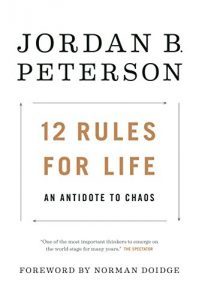 I first heard of Professor Jordan B. Peterson the way many people have: I watched Cathy Newman’s disastrous interview where she deliberately misrepresented every one of his responses, requiring him to correct her time and time again with a level of patience and humor one rarely sees in such hostile circumstances. Then I saw some highlight reels of his lectures. Then people I liked and respected started to say good things about him. So I picked up Peterson’s book 12 Rules for Life: An Antidote to Chaos and began reading.
I first heard of Professor Jordan B. Peterson the way many people have: I watched Cathy Newman’s disastrous interview where she deliberately misrepresented every one of his responses, requiring him to correct her time and time again with a level of patience and humor one rarely sees in such hostile circumstances. Then I saw some highlight reels of his lectures. Then people I liked and respected started to say good things about him. So I picked up Peterson’s book 12 Rules for Life: An Antidote to Chaos and began reading.
It is, without doubt, the most frustrating book I’ve ever read.
Frustrating because I find myself wishing this book had come to me twenty years ago. Twenty-five years ago. But back then my head was so firmly wedged up my rear end that I would’ve scoffed at the book as unable to teach the brilliant me anything I didn’t know. So I’ve had to content myself with the acknowledgment that I’ve read the book today, in my middle years, and that it still taught me a great deal about myself, why I do what I do, and most importantly, how to change what I don’t like about myself. I wish I’d read it sooner.
Criticisms of the book include claims that Peterson’s maxims like Pursue what is meaningful (not what is expedient) and Do not let your children do anything that makes you dislike them are too simple, that all you need to do is look at the chapter headings and you’ve gotten as much as you need from the text. These criticisms miss the forest for the trees. Drawing on his clinical experience, his research, his life experience, and texts like Paradise Lost and The Brothers Karamazov (among many others), he supports these maxims with thoughtful foundations that not only lead you to wisdom, but show you a path to seek out further learning.
He acknowledges suffering in a deeply personal way, describing what he and his family have gone through, not to mention his patients. But he also shows a way past it, a way to overcome suffering through tiny victories that lead to larger ones. It’s this acknowledgment, this explanation that no matter what you’re suffering you’re not truly alone in the mass of anguished humanity, that really shines. He addresses lying to oneself and lying to others as a terrible, soul-destroying poison in Rule 8: Tell the truth – or, at least, don’t lie; the seething anger of mass murderers (and those who idolize them) in Rule 6: Set your house in perfect order before you criticize the world; toxic relationships in Rule 3: Make friends with people who want the best for you; and many other subjects.
As a long-time student of the interpretation of body language, I found this statement of his fascinating: “Much of what we consider healthy mental function is the result of our ability to use the reactions of others to keep our complex selves functional. We outsource the problem of our sanity.”
This one was another favorite (over a thousand other people also found it meaningful): “It is far better to render Beings in your care competent than to protect them.” Excellent advice, particularly for parents. (There’s a reason why the term Being is capitalized. Read the book to find out.)
After I read the book, I looked back at the Cathy Newman interview and found that Peterson indeed practices what he preaches. The most remarkable moment in the interview is at 22:11, when Newman asks the patently ludicrous question, “Why should your right to freedom of speech trump a trans person’s right not to be offended?” Peterson’s answer is both pointed and poignant when he says, “Look at the conversation we’re having right now. You’re certainly willing to risk offending me in the pursuit of truth. Why should you have the right to do that? It’s been rather uncomfortable.” That simple honesty, that acknowledgment of discomfort, is something you almost never see in an interview. And Newman literally had no answer to it.
Improvement demands discomfort. Even pain. But you don’t have to bull your way through it alone. That’s where 12 Rules for Life comes in. You don’t have to agree with all of it, but you will come out the other end a lot smarter and wiser than you did before you cracked the book. How often can you say that about anything you read?







February 12, 2018
Movie Review: The Childish Thing
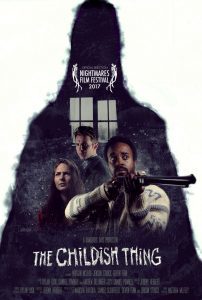 I reviewed the indie short The Childish Thing at The Slaughtered Bird:
I reviewed the indie short The Childish Thing at The Slaughtered Bird:
Is it horror? Sort of, but it’s subtle and deep, and the protagonist Jack makes us feel every bit of it in a terrific performance. He’s tasked with cleaning out the basement and garage of the home he’s lived in since childhood, and hence must grapple with all the issues that entails. His absent brother, clearly loved, leaves an aching hole in the narrative that the viewer can’t help but fill, and that’s one of the movie’s greatest strengths: what it doesn’t say, what it doesn’t show.
Did I like this movie? If so, how much? Click to find out!







February 6, 2018
Three Brief Movie Reviews
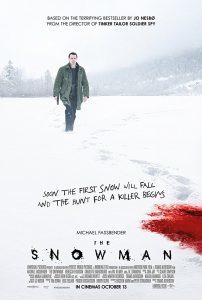 Like you, I saw the trailer for the movie The Snowman and thought: awesome! Creepy and frightening. Then the reviews came in, and they were near-universally negative. Everyone hated it. Still, I figured that I’d see for myself; after all, I’ve really liked a bunch of terrible stuff and loathed some quite popular stuff. I mean, how bad could it be?
Like you, I saw the trailer for the movie The Snowman and thought: awesome! Creepy and frightening. Then the reviews came in, and they were near-universally negative. Everyone hated it. Still, I figured that I’d see for myself; after all, I’ve really liked a bunch of terrible stuff and loathed some quite popular stuff. I mean, how bad could it be?
Well, The Snowman wasn’t bad, but it wasn’t good, either. I’m generally pretty terrible when it comes to guessing the murderer in whodunit-style movies, but I figured out who the villain was less than halfway through. Every actor except for Michael Fassbender was wasted in thankless, minor roles, from Chloe Sevigny to Val Kilmer to J.K. Simmons. I got the impression that the film was the Cliffs Notes version of the novel, with important parts glossed over, red herrings unfished-for, and subplots ignored completely. They did the worst job possible dubbing in Val Kilmer’s lines (I know the man was recovering from cancer treatment, but his two-minute role would have been better played by someone who could talk). Everything seemed freezing cold, but the filmmakers completely eliminated all cultural references to Norway, giving the viewer no sense of place. I was entertained, but not thrilled. I’m sure the book was better. If you’re going to do a Harry Hole movie, why not do another series like Wallander or something and sell it to Netflix?
—
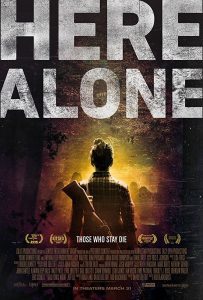 For a more subtle sort of zombie apocalypse film, you need look no further than Here Alone, which is light on the zombies but heavy on the drama. Much of the movie is focused on protagonist Ann, who lost her husband and child in the chaos of a viral zombie apocalypse and is just doing what she can to survive day to day in the Pacific Northwest. (Like so many of us, I guess.) Lucy Walters as Ann carries the role with a skillful mixture of pathos and bloody-mindedness. Despite having lost everything, she’s a survivor. How she came to be alone is told in flashbacks, some of which are terribly wrenching and hard to watch. Her carefully-balanced existence is, of course, upended when a couple of other people wander in, and things shake out more or less the way you’d expect in a movie like this. If everybody got along, it’d be pretty boring. Nevertheless, there are some surprises here and there, particularly the ending, which makes little sense even with the attempt to bolster character motivations in flashbacks. That was the part I didn’t like so much. Overall, though, I’m glad I watched it. It’s a good movie.
For a more subtle sort of zombie apocalypse film, you need look no further than Here Alone, which is light on the zombies but heavy on the drama. Much of the movie is focused on protagonist Ann, who lost her husband and child in the chaos of a viral zombie apocalypse and is just doing what she can to survive day to day in the Pacific Northwest. (Like so many of us, I guess.) Lucy Walters as Ann carries the role with a skillful mixture of pathos and bloody-mindedness. Despite having lost everything, she’s a survivor. How she came to be alone is told in flashbacks, some of which are terribly wrenching and hard to watch. Her carefully-balanced existence is, of course, upended when a couple of other people wander in, and things shake out more or less the way you’d expect in a movie like this. If everybody got along, it’d be pretty boring. Nevertheless, there are some surprises here and there, particularly the ending, which makes little sense even with the attempt to bolster character motivations in flashbacks. That was the part I didn’t like so much. Overall, though, I’m glad I watched it. It’s a good movie.
—
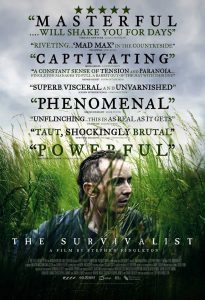 I’ll round out the roundup with another apocalyptic film, The Survivalist. No zombies here: just some kind of dreadful end of civilization catastrophe that may or may not be centered around an environmental event or other. Too much fossil fuels, I guess. Or everyone ate too many Tide pods. Martin McCann plays the unnamed, eponymous Survivalist, a man with a tiny farm in the middle of nowhere. He kills the foragers who come to raid his farm, jerks off into plant seedlings, and doesn’t say a word for the first 17 minutes of the film. Then, as is too often the case, a couple of other people wander in, and his carefully-balanced existence is upended. Whoa. Déjà vu. Anyway, the movie’s a lot better than I’m making it seem. The characters have to make terrible choices: trading sex for a bowl of soup, who to murder and who not to murder, and who’s more important: lover or mother. It’s terribly grim despite the beautiful Irish scenery, with tall grass and meadows and lots of rain. The performances are excellent, with actors conveying great affect in expressions and shared looks. You can’t expect happy endings in movies like this, but perhaps you can hope for a less-terrible tomorrow. Do you get that in The Survivalist? You’ll have to watch it to find out. And you should watch it.
I’ll round out the roundup with another apocalyptic film, The Survivalist. No zombies here: just some kind of dreadful end of civilization catastrophe that may or may not be centered around an environmental event or other. Too much fossil fuels, I guess. Or everyone ate too many Tide pods. Martin McCann plays the unnamed, eponymous Survivalist, a man with a tiny farm in the middle of nowhere. He kills the foragers who come to raid his farm, jerks off into plant seedlings, and doesn’t say a word for the first 17 minutes of the film. Then, as is too often the case, a couple of other people wander in, and his carefully-balanced existence is upended. Whoa. Déjà vu. Anyway, the movie’s a lot better than I’m making it seem. The characters have to make terrible choices: trading sex for a bowl of soup, who to murder and who not to murder, and who’s more important: lover or mother. It’s terribly grim despite the beautiful Irish scenery, with tall grass and meadows and lots of rain. The performances are excellent, with actors conveying great affect in expressions and shared looks. You can’t expect happy endings in movies like this, but perhaps you can hope for a less-terrible tomorrow. Do you get that in The Survivalist? You’ll have to watch it to find out. And you should watch it.







February 1, 2018
Book Review: Squeegee the Sewermaid
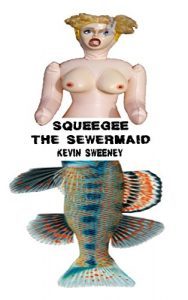 Kevin Sweeney’s bizarro short story Squeegee the Sewermaid starts thusly:
Kevin Sweeney’s bizarro short story Squeegee the Sewermaid starts thusly:
“I was on the toilet throttling a sweetcorn Snickers when a hand reached up and grabbed my cock.”
Things get even more bizarre and horrific from there. I read this story four days ago and my stomach still hasn’t settled into its usual shape, so eating’s been a bit of a challenge. Sweeney’s world is a dystopia of extinct animals and cultural reappropriation and the largest jelly bean factory in the UK, with a sewermaid just plopped in the middle like the proverbial chocolate hot dog in the punchbowl. Hysterically funny (poop jokes always get a laugh), imaginative, and acrid in its social commentary, Squeegee the Sewermaid is the kind of story you’d only read on a lark, but then find yourself glad you did. With English slang as thick as treacle and descriptive power that hits you like a fish tail to the jaw, there’s a lot to recommend it.
And yet, I still kind of want to throw up. Oh my GOD, it’s disgusting. So it may not be for everyone. Sweeney writes well and tells a story that you want to see to the end, despite its deliberate unpleasantness. I don’t get to say that as often as I’d like when it comes to indie fiction, so let that be your guide.







January 29, 2018
My Ghost Story in Issue #2 of Creators Unite Magazine
 My story A Haunting in Pennsylvania is featured in Creators Unite #2, The Woman Power Issue!
My story A Haunting in Pennsylvania is featured in Creators Unite #2, The Woman Power Issue!
Creators Unite is a magazine that fuses horror, art, and culture, focusing on independent voices and original content. Inside you’ll see interviews with actresses Kelli Maroney (Night of the Comet), Maria Olsen (Percy Jackson and the Olympians: The Lightning Thief), Denise Gossett (Get the Gringo); movie reviews; original articles; a tribute to model Kreepazoid Kelly; my story A Haunting in Pennsylvania; an amazing art gallery, and a whole lot more.
Click here to read Creators Unite #2 absolutely free of charge!
I’m as surprised as you are that I’m in a publication that has anything to do with woman power, but hey, I’ll take it. Do you like ghost stories? Who doesn’t! A Haunting in Pennsylvania takes the traditional ghost story and turns it inside out in a way you’ll never forget. And the best part is, there’s pictures!
This is a quality magazine, one I’m proud to be part of. Check it out.








